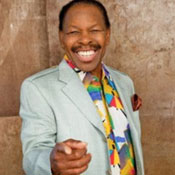Featured Artist: Mr. Personality, Lloyd Price
 March 13, 1952, was a fine spring day for Specialty Records president Art Rupe: a fine day made even more so when, for a couple of hanging-around-the-studio drinks and a mere fifty-five dollars, he’d enticed New Orleans’ hottest star to play for him. The singer on the date — Lloyd Price from nearby Kenner — had never been in a studio before and here was Fats Domino asking him about some kind of “key” for Lloyd’s song “Lawdy Miss Clawdy.”
March 13, 1952, was a fine spring day for Specialty Records president Art Rupe: a fine day made even more so when, for a couple of hanging-around-the-studio drinks and a mere fifty-five dollars, he’d enticed New Orleans’ hottest star to play for him. The singer on the date — Lloyd Price from nearby Kenner — had never been in a studio before and here was Fats Domino asking him about some kind of “key” for Lloyd’s song “Lawdy Miss Clawdy.”
Lloyd hummed a few bars and Fats slid into a piano triplet intro that rolled like the Mighty Mississippi on a lazy summer afternoon. A few takes later, Lloyd’s ad-libbed Lawdy — which he’d built on a signature phrase used by WBOK radio DJ James “Okey Dokey” Smith — was in the can. Lloyd walked out and went back to playing the local proms and clubs with his brother Leo.
Soon Smith himself was spinning and raving about Lloyd’s Miss Clawdy, as were deejays and kids across America. On July 12, “Lawdy” took over the top spot on Billboard magazine’s R&B chart and stayed there for seven weeks: an amazing feat for the 19-year-old who didn’t even consider himself a singer. “I still don’t,” says Lloyd. “I’m a stylist, and I can fit inside a rhythm. I don’t hold notes like singers do.”
Notes or not, Lloyd Price became the first teenager to sell a million records, and says Lloyd proudly, “It brought everybody together.” My music was important socially in getting young white and black kids touching hands. When I was a kid, they didn’t even speak to each other. ‘Lawdy Miss Clawdy’ started a youth movement.”
After “Lawdy,” Lloyd landed four more sides in the R&B Top 10. Then Uncle Sam came a knockin’. When Lloyd returned to civilian life “twenty-three months and thirteen days” later, everything had changed. “The whole sound that I had created was now being done by everybody,” says Lloyd — notably by a singer whom Price himself had recommended to his label. “I told Art Rupe about this kid I had seen in Macon, Georgia, with all this crazy hair. I had never seen nothing like Little Richard!”
“When I got out of the Army, Little Richard was the king of Specialty and on fire [so] I started producing and making music with my own publishing and record companies,” both groundbreaking firsts for an African-American artist. The initial release on his KRC label was “Just Because,” a song quickly covered by Price’s former valet and current second cousin for, of all labels, Specialty, prompting Lloyd to partner with ABC-Paramount for distribution.
Despite the unexpected competition from cousin Larry, Price’s “Because” won out: peaking at No. 3 R&B, reaching the Billboard pop Top 30, and hitting No. 15 in Cash Box. A solid comeback to be sure, but Lloyd wanted more. “Whenever I had a hit, I was never satisfied with the way it sounded. It was always something that had me going crazy, to keep doing something else.”
In 1958 that “something else” involved a sound that Lloyd says he “started thinking about when I was in Special Services, [where] I was able to use all the musicians. I got away from that Louisiana sound and I just continued to do it when I came out.”
Lloyd tried out his new sound of R&B vocal meets big band swing on his next A-side, “You Need Love.” “The only ones that ever heard it were me and [arranger] Don Costa and the orchestra on the session! A deejay called us one afternoon from Spokane, Washington, and said, ‘You guys are on the wrong side. “Stagger Lee” is the hit!’”
The saga of “Stagger Lee” dated back to Christmastime 1895 when Lee “Stag” (or “Stack”) Shelton and William “Billy” Lyons tangled in a St. Louis saloon. Drinking had led to arguing, then Billy grabbed Lee’s hat. Lee’s revolver ended the matter as well as Billy’s life. It was a sordid story too juicy to ignore and was quickly immortalized in song.
While in the Army, Lloyd, “tired of doing ‘Tea for Two’” for the officers, put a new spin on the old song. “I [created] a mini-play. I got the introduction when I was in Seoul [Korea]. ‘The night was clear and the moon was yellow. And the leaves came tumbling down.’ Except there was no leaves; I just added that!”
Although “Stagger Lee” was an instant stone-cold smash at radio, Dick Clark had a problem with the too-raw-for-teenagers tale. “I had to re-record a special song that he would play,” says Lloyd. “I had to make Stagger Lee and Billy argue about some girl. I still don’t remember what I said in the lyrics because I [never performed it], not one single time.” For their part, teens loved Stagger’s story, which topped the R&B and pop charts for four weeks and went gold. Lloyd was back with a vengeance.
“Stagger Lee” was followed by “Where Were You (On Our Wedding Day)?” (No. 23 Pop/No. 4 R&B), the million-selling “Personality” (No. 2 Pop/No. 1 R&B), and “I’m Gonna Get Married” (No. 3 Pop/No. 1 R&B). The latter was a double-sided hit, as were Lloyd’s next two singles. He finished up his ABC-Paramount hit streak in 1960 with “Question,” marking a remarkable run of 11 chart sides in just 18 months.
With all that recording success, Lloyd was ready to “go to the next stage” and started his Double-L label, releasing discs by a singer he discovered, the soon-to-be-legendary Wilson Pickett. Lloyd himself scored with a version of the American songbook standard “Misty” in 1963 and spent the next 10 years recording for his own and other labels.
Then, having conquered the music business, Lloyd moved on. “When the fun left, I quit making records. I started producing fights with Don King. I produced the Rumble in the Jungle (the historic heavyweight boxing match between George Foreman and Muhammad Ali). I produced the Thrilla in Manila (between Ali and Joe Frazier). For 20 years, all I did was produce fights. I was just out of the groove of music.”
If your mind is already boggled by the extent of Lloyd’s accomplishments, hang on. There are some more: He owned a Manhattan nightclub (another African-American first), formed two real estate companies, bowled six perfect games (he’s in the United States Bowling Congress Hall of Fame), and founded a food product company. He’s also in the Rock and Roll Hall of Fame and has a Broadway show based on his life in the works.
Asked about what he’s most proud of, Lloyd unhesitatingly replies, “To be an American. [Although] I’m proud of my heritage as an African, there is no African-American flag. I fought under the American flag and want to be treated as equal as anyone else. America is the best place on Earth.”
To us, his fans, Lloyd says, “I believe you must always be truthful with yourself, and if you’re not truthful with the audience, you should quit doing it. I want them to know that I’m really sincere about doing it for real,” then adds, “and they can expect good rockin’ tonight!”
Don’t miss your chance to see Lloyd Price when he performs on Malt Shop Memories Cruise 2014. Review remaining cabin options.
